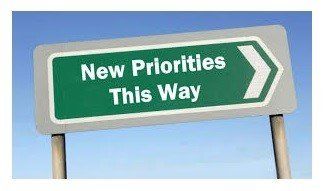How are organisations adapting to the 'new normal'? - Part 4
Kirsty Brooks
June 26, 2020
How do our leaders think they will need to change?

The Senior HR Network conducted a series of interviews with our extensive network of leaders from a multitude of industries both public and private sector, all above SME level, based nationally and internationally to understand their recent Covid-19 experience. Together we explored what life was like immediately after the announcement of ‘lockdown’, their experience thus far and their current thinking around managing ongoing change, transition and the future state.
We asked: How do our leaders think they will need to change?
While we can’t predict the future, our leaders had a consistent message when asked how they think they will need to change post-crisis. Very simply, leaders are going to have to gear up with a short, medium and long term plan, both economically and how they lead their workforce, the responses we received were split into three main areas:
Bringing our workforce back to a safe environment
Our survey found that in the short-term leaders have to tactically plan, where employees are unable to work remotely leaders are preparing for the provision of social distancing in the workplace, gaining access to Personal Protective Equipment (PPE) and flexibly rotating their employees to allow for the additional space needed to provide a safe environment. Leaders will need to consider the employees who may have a fear of returning to a social work environment and consider turning the dial up on empathy and managing varied emotions through change, while also maintaining their own emotional responses.
For some leaders, they are having to manage a large proportion of their workforce that has not been into a workspace for over ten weeks and who may be considering their future options in working flexibly or differently. It is expected that a high number of employees will request flexible working, shorter hours or even just not return to the workplace at all!
Technological transformation
Before the Covid-19 crisis, many businesses were pursuing digital transformation programmes to allow for a more flexible workforce, greater collaboration and improved stakeholder experience. This was a self-paced transformation that has now become an urgent priority. For some that we surveyed, digital transformation and remote working had been, in the past, a low priority and the traditional mindsets to working and delivery were still evident.
Our workforces and customers have mostly been given an opportunity to ‘try out’ and get ‘accustomed’ to digital consumerism, working, and collaboration all at once. The movement towards a digital business model in such a short period of time will become the new normal, and leaders will have to accept the change, innovate with their teams to keep pace and learn to collaborate in a very different way.
The technological shift, coupled with the restriction we have had on travel both locally and globally, will present a challenge if our leaders don't keep up with their teams preference to use technology more and travel less, in particular, this will be prevalent in the more traditional sectors. The paced move to digital transformation and the new ways of working must be viewed holistically by leaders, maintaining focus on the human side of digital transformation at least as much as the technological side.
Recovering business performance and workforce planning
While business performance will remain a high priority, leaders must consider the retention of skills, talent and balancing how they bring back the right workforce to deliver on customer demands while stabilising financial performance. Without a shadow of a doubt, for some organisations, a planned restructuring and reduction in workforce is imminent, particularly where government support has allowed flexibility in retaining employees. Initially, an element of reactiveness will be observed in both restructuring and recruitment needs to meet financial challenges and the fluctuation in customer demand while also accommodating the new ways of working. Each role, service or product will be scrutinised for the value that it brings to both the organisation and the customer in the future world.
About the authors
The Senior HR Network was set up to provide senior HR practitioners across the UK and across disciplines to share knowledge, learnings and experiences and expand future thinking in people and organisations.
The Senior HR Network was set up to provide senior HR practitioners across the UK and across disciplines to share knowledge, learnings and experiences and expand future thinking in people and organisations.
Kirsty Brooks, People Perform Consulting Limited
Telephone: 0333 577 1319
Email: Kirsty@peopleperform.co.uk
Telephone: 0333 577 1319
Email: Kirsty@peopleperform.co.uk
Andrew Carter, Reward Risk Management Limited
Telephone: 07904439172
Email: andrewc@rewardrisk.co.uk
Telephone: 07904439172
Email: andrewc@rewardrisk.co.uk
Jo Brooks, Aligned HR Services
Telephone: 07788278295
Email: joanna@alignedhrservices.org.uk
Telephone: 07788278295
Email: joanna@alignedhrservices.org.uk
Johanna Hooper, Limitless Peak Performance
Telephone: 07713196730
Email: johanna@limitlesspeakperformance.co.uk
Telephone: 07713196730
Email: johanna@limitlesspeakperformance.co.uk
Richard Frost, People Perform Consulting Limited
Telephone: 0333 577 1319
Email: Richard@peopleperform.co.uk
Tina Jennings, Cosán Cróga Limited
Telephone: 07765 060298
Email: tina@cosancroga.com
Jane Baalam, Reward Risk Management Limited
Telephone: 07415 974004
Email: janebaalam@rewardrisk.co.uk
Telephone: 0333 577 1319
Email: Richard@peopleperform.co.uk
Tina Jennings, Cosán Cróga Limited
Telephone: 07765 060298
Email: tina@cosancroga.com
Jane Baalam, Reward Risk Management Limited
Telephone: 07415 974004
Email: janebaalam@rewardrisk.co.uk









